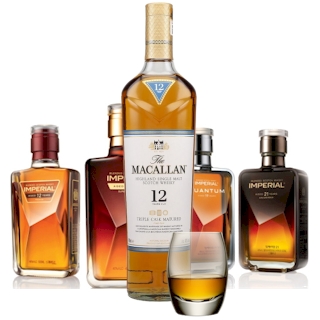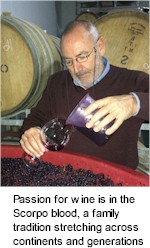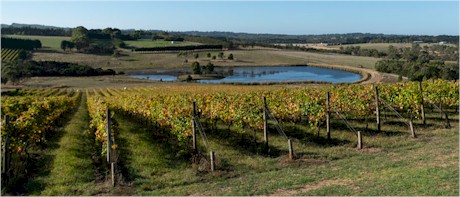


The Scorpo family vineyard in Merricks North on the Mornington Peninsula, combines old world practices with new world flavours. Scorpo Wines combines the family heritage with expertise in growing premium grapes, meticulous attention to site selection, and a best practice approach to vineyard management and processes, trusting the old axiom that great fruit makes great wine. After extensively researching the Mornington Peninsula’s cool, maritime microclimates, Scorpo knew this area was the perfect place for our project. Driving through the ridge systems on the Peninsula one day in 1996, they happened upon a For Sale sign on a parcel of a defunct cherry and apple orchard originally planted in the 1900s, nestled in the rolling hills, halfway between Port Phillip Bay and Westernport. Amongst, the pine trees, abandoned stables, machinery sheds and Welsh ponies, they could see the untapped potential of this site.

The property was an overgrown orchard with six acres of remnant bush vegetation. The site was multi dimensional, besides the excellent grape growing conditions, it also offered a large scope of ecological possibilities. Since 1997, Scorpo have been rejuvenating the bush block by planting many indigenous plants such as Messmates, Melaleucas, Wattles and native dogwoods. Thousands of indigenous trees, shrubs and groundcovers have been planted along the roadside reserves around the vineyard. A 5 ha Olive Grove was also planted, along with fruit orchards and a kitchen garden. Comprising 17 Acres, the initial 10 Acres was planted in 1997. A further 1.5 acres of high density was planted in 2014.
Scorpo chose Mornington Peninsula for the unique climatic conditions of the area, ideal for growing high quality cool climate varietals, especially Pinot Noir and Chardonnay. The vineyard is operated under the principle that quality wines are made from low yielding, hand picked crops. And that the vineyard determines the ultimate quality of the wine.
Scorpo farm sustainably. All grapes are hand picked and wild yeast fermented in concrete fermenters, old and new oak barrels and stainless steel fermenters. Pinot Noir and Shiraz, as well as the amber hued Bestia, are open vat fermented. Chardonnay and Pinot Gris are fermented in old and new barrels, sometimes concrete vat fermented. Each varietal clone is vinified individually to ensure that terroir differences are highlighted.
The Scorpo family vineyard in Merricks North is located at the heart of the Mornington winegrowing region. Chardonnay, Pinot Noir a small amount of Pinot Gris and Shiraz were planted on red/blown, clay/loam soils derived from Tertiary Eocene, 40 million years, older volcanics, between an altitude of 70m to 100m above sea level on a north/northortheast facing 10% slope. It makes a brilliant suntrap and ideal drainage to slowly grow and ripen grapes. The vines are planted at different densities, varying from 2425 per hectare to 10000 vines per hectare. Scorpo Wines are distinctive, in that the wines are made to express the flavours of the new world, in the style of the old world. They reflect their location and the unique characteristics of the soil and climate they are grown.
